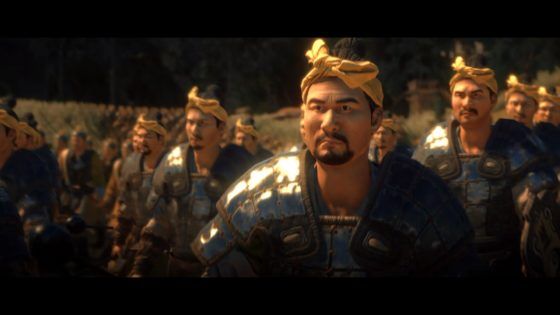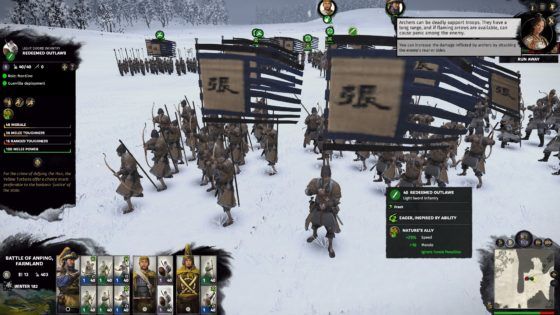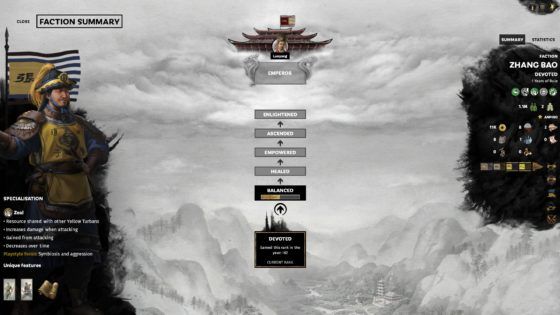“Opportunities multiply as they are seized,” wrote the ancient warrior-philosopher Sun Tsu. Total War: Three Kingdoms has followed this philosophy with an incredible slew of DLC since its launch. Pushing three stand alone expansions, one which added ‘mature-rated effects,’ and another which unlocked the already present Yellow Turban Rebellion forces, Three Kingdoms is already rife with content. Our review in May of 2019 confirmed as much, allotting the game an incredibly solid 8/10. But does its newest expansion, Mandate of Heaven, add anything to game already packed to the brim?
Set in 182CE, the Han Empire and dynasty is in utter turmoil. Rife with corrupted ministers and power-hungry warlords, the Emperor's court has done little to support its ailing populace. With a great famine scouring the northern reaches many believe that Emperor Ling has lost the Mandate of Heaven, a mark of heaven which bestows the natural leader through the will of the universe. The people believe him to be no longer fit for rule, and with it rebellion rises. Led by the three Zhang brothers, Jue, Liang and Bao, they equip themselves with yellow clothing and begin to take steps which will create the volatile Yellow Turban Rebellion.
The main draw from Mandate of Heaven is adjustments to the pre-existing campaigns. Starting earlier than Three Kingdom’s original gameplay in both Romance and Historical mode, this allows players to engage in the backstory of famous characters. Following those such as Sun Jian, you can play the original game in much the similar way. However, similar to Eight Princes this expansion introduces a plethora of new playable characters.
The first, and perhaps most expansive, are the three Zhang brothers. Jue, Liang and Bao are all playable. Each has their own particular role and playstyle, with traits best suited to them. Zhang Bao, for example, focuses primarily as an offensive general while Jue and Liang are suited to more diplomatic or thoughtful roles. The brothers, while creating the Rebellion, use a shared resource called Zeal. Instead of the passive generation of populaces and food, Zeal is generated through actions which improve the strength of the Yellow Turban forces. Actions such as sacking cities or participating in combat will award Zeal, increasing with greater feats.

The Zhangs’ also utilize a pseudo-sociological mechanic called Fervor. Frankly, it translates to best how you can whip up local populaces into a Han-hating frenzy. Even just the mere presence of the Yellow Turbans can create civil unrest for the Hans, and increase the harshness of their punishments to the populace.
The trio of brothers also feature a split Reform tree; while other characters feature one branching cherry blossom of Reforms, the Zhangs’ have broken them down into four categories. This allows you to best adapt your strategies without unlocking baseline prerequisites and tap into other fields to diversify an ever-changing gameplay. This three new commanders alone bolster up Mandate of Heaven significantly, and offer a more aggressive (or thoughtful) playstyle to what in some cases can become a passive game in Three Kingdoms.
The other playable heroes sadly plateau out from here. While the whole Han Empire faction is playable, including the Emperor himself, most simply do not hold a candle in comparison. The Emporer, Liu Hong, is steeped in a faction-based court system. Vying with the different bodies, such as the Bureaucrats and Warlords, increases his political power over time and grants even further weight in the late game. Such power can obliterate obstacles that players may face in other campaigns (such as corrupt power-figures), but requires a deep investment in playing between factions. While there are two more Han players, their chief mechanics revolve around utilizing passive buffing mechanics from rare objects and aren’t particularly noteworthy.
This expansion revolves around the rise or fall of the Han dynasty. The Yellow Turbans must either raze an incredible amount of real estate in their path to generate unrest, or take the Han capital itself. The Hans, likewise, must either wipe out the Yellow Turbans or dominate the country. The only differing and unique win condition comes from Liu Hong, who’s conditions can change wildly depending on how he restructures his crumbling government.
The Yellow Turban Zhangs, however, utilize a mechanic known as ‘The Mandate War’. Early on after completing their first few objectives, a bar similar to the one that shows your army’s strength in conflict will appear on the overworld map. This bar symbolizes the progress of both the Yellow Turbans and the Han Empire; only by filling it can the Turbans level up their status, generals and ultimately claim all of China.
Everything else, in comparison, just does not quite hold a candle to these two major gameplay overhauls for the new generals. While there are 40 additional units to recruit, most are an amalgamation or gentle adjustment of previous units and do not impact or change up gameplay drastically. Similarly, several previously unavailable factions are now playable in Mandate of Heaven. They aren’t, however, drastically different and arguably should have been included in the base game.
Gameplay: 8/10
No matter how you slice it, Mandate of Heaven is still built on the firm foundations of Three Kingdoms. This DLC does offer enough gameplay to shake up those foundations, and it occasionally takes it in radical and fun new directions. Whereas Eight Princes tussled with the idea of making off-the-wall changes, Mandate instead takes a safer stance and doesn’t stray too far from the original’s concepts.
Innovation: 7/10
Systems such as the ‘talent-tree’ style Reform system and the Emperor's Imperial Powers are fun and joyous additions to a game that otherwise didn’t do much to innovate from its predecessors. They flesh out the breadth of its content while keep the same relative depth, allowing players to be masterful politicians or war-hungry tacticians at their own pace.
Learning Curve: 9/10
Like the base game, Mandate of Heaven is incredibly intuitive to pick up and play. There is an ongoing soft-touch tutorial to lead you to the next moves, with clear direction being given for new players. All of this can be toggled off for veterans, without losing the concepts of overarching gameplay or undue difficulty.

Graphics/Sound: 6/10
An issue we mentioned previously in our original Three Kingdoms review, there have been some graphical fixes and corrections rolled out both in previous patches and Mandate. However, the game now struggles to play smoothly on similar PCs as our previous review, with noticeable slow-down and framerate hangs. These are a rarity during regular gameplay but sadly several very large objects are still oddly low resolution despite higher textures all around it. Cinematic have since taken a detour from the original soft brushwork that gave the game its unique artstyle, and instead now use versions of rendered in-game models, sometimes to comical effect.
Value: 5/10
Is Mandate of Heaven enjoyable to play through? Absolutely it is, but is it worth its cost? If it features a similar cost to Eight Princes, that question may be a tepid ‘no.’ While what it does inject is different and exciting, there’s simply not enough that breaks the pre-established mold to keep players returning. While longer than Eight Princes, that length only comes due to the base game’s high faction diversity and populated map.
Overall: 7/10
Mandate of Heaven is a good addition to Three Kingdoms, certainly more so than its previous expansion. However it enacts more as a ‘bolt-on’ expansion rather than new or exciting content. While what is presented is indeed fun to toy with and can add multiple playthroughs for interested parties, you are still playing Three Kingdoms. It’s simply about 8 years earlier.
